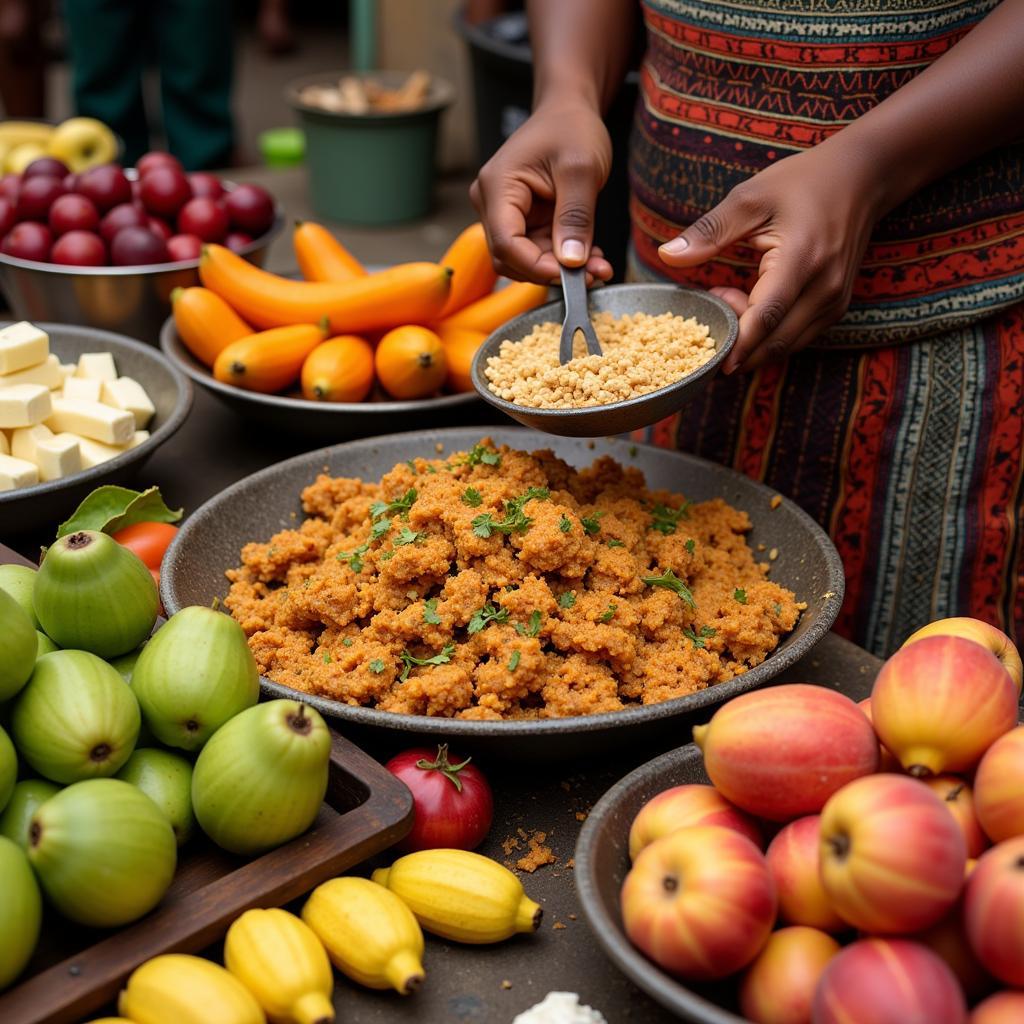Exploring the Magic of African Drumming Rhythms
African Drumming Rhythms are more than just percussive sounds; they are the heartbeat of a continent, a vibrant tapestry woven from centuries of tradition, storytelling, and spiritual expression. From the bustling marketplaces of Accra to the serene landscapes of the Serengeti, the rhythmic pulse of drums resonates through every aspect of African life. These rhythms are not merely entertainment; they are a complex language, a powerful form of communication that transcends words and connects people to their heritage, their community, and the very essence of their being.
The Rich Tapestry of African Drumming Traditions
Across the vast expanse of Africa, drumming traditions vary widely, reflecting the unique cultural identities of each region and tribe. While some rhythms are associated with joyous celebrations and festive gatherings, others serve a more solemn purpose, accompanying rituals, ceremonies, and even moments of mourning. The diversity of drumming styles is truly breathtaking, from the intricate polyrhythms of West Africa, featuring multiple interlocking patterns played simultaneously, to the mesmerizing trance-inducing rhythms of the Berber tribes of North Africa. African drumming performers showcase this rich heritage.
The instruments themselves also contribute to the unique soundscapes created by African drummers. From the djembe, a goblet-shaped drum played with bare hands, to the talking drum, capable of mimicking the tones and inflections of human speech, each instrument possesses its own distinct voice and character. These instruments, often crafted from natural materials like wood, animal hide, and gourds, are not mere tools; they are considered sacred objects, imbued with spiritual significance and treated with reverence.
What Makes African Drumming Rhythms Unique?
What sets African drumming apart is its emphasis on polyrhythms, the layering of multiple independent rhythmic patterns. This complex interplay of rhythms creates a dynamic and captivating soundscape that is both intricate and deeply moving. It’s not just about keeping time; it’s about creating a conversation between different drums, each contributing its own unique voice to the overall rhythmic tapestry. This intricate layering of rhythms is often accompanied by singing, dancing, and other forms of artistic expression, creating a truly immersive and multi-sensory experience.
Furthermore, African drumming is deeply rooted in community and social interaction. It serves as a powerful tool for bringing people together, fostering a sense of unity and belonging. From celebratory occasions to rituals and ceremonies, drumming provides a rhythmic backdrop to many aspects of African Life, strengthening social bonds and reinforcing cultural identity.
If you’re in Sydney and want to experience this firsthand, look into African drumming lessons Sydney.
The Healing Power of Rhythms
Beyond its cultural and social significance, African drumming is also believed to possess healing properties. The rhythmic vibrations of the drums are thought to resonate with the human body, promoting physical and emotional well-being. Some practitioners believe that drumming can help to reduce stress, alleviate anxiety, and even boost the immune system. African drumming 4 hypnotic healing rhythms explores this aspect in detail. The repetitive nature of the rhythms can induce a trance-like state, allowing for deep relaxation and introspection.
How Can I Learn More About African Drumming Rhythms?
There are numerous resources available for those interested in learning more about African drumming. From online tutorials and instructional videos to in-person classes and workshops, there are many ways to explore this fascinating art form. You can also find a wealth of information in books, documentaries, and academic journals dedicated to the study of African music and culture. Attending live performances and cultural festivals is another excellent way to immerse yourself in the vibrant world of African drumming.
Conclusion
African drumming rhythms are a testament to the rich cultural heritage and artistic brilliance of the African continent. They are a powerful form of expression, a vibrant language that speaks to the heart and soul. Whether you are a seasoned musician, a curious listener, or simply seeking a deeper connection to the world’s diverse musical traditions, exploring the magic of African drumming rhythms is sure to be a rewarding and enriching experience. So, immerse yourself in the pulsating rhythms, let the music move you, and discover the transformative power of African drumming.
FAQ
- What is the most common drum used in African drumming? The djembe is one of the most widely recognized African drums.
- Are there different types of African drumming? Yes, drumming styles vary greatly across Africa, reflecting regional and tribal differences.
- What is the significance of polyrhythms in African drumming? Polyrhythms create complex and layered rhythmic textures, adding depth and dynamism to the music.
- Is African drumming difficult to learn? While mastering the intricacies can take time, the basics are accessible to people of all ages and skill levels.
- What are some health benefits of African drumming? Drumming can be therapeutic, reducing stress, promoting relaxation, and fostering a sense of community.
- Where can I find African drumming classes near me? Search online for local music schools, cultural centers, or community organizations that offer drumming classes. For specific events check out our african carnival 2019 article.
- Are there online resources for learning African drumming? Yes, numerous websites and online platforms offer tutorials, videos, and other learning materials. You can also consider african folk instruments to widen your understanding.
Do you have any other questions regarding African music and culture? Check out our other related articles on our website.
When you need support, please contact us at Phone: +255768904061, Email: kaka.mag@gmail.com or visit us at Mbarali DC Mawindi, Kangaga, Tanzania. We have a 24/7 customer support team.

